
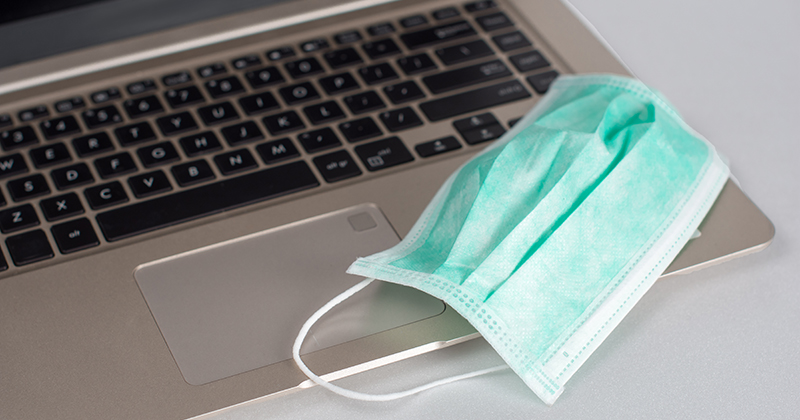

Notes from the frontline
May 19, 2020
The Internet has made everyone a writer, with the power to share their opinions and observations with the wider world.
But to be a journalist is different. There are rules, ethics and standards for accuracy—distinctions that feel especially relevant now, as the global death toll from COVID-19 approaches 300,000, more than 30 million Americans remain out of work, and neither widespread testing nor an approved vaccine currently exist.
“When people talk about honoring our front-line workers, journalists are almost never on the list,” says Dawn Fallik, associate professor and former director of the University’s journalism program. “But our graduates are out there, covering protests, taking photos, breaking down the science.”
Working at The New York Times, Vox, The Atlantic and hundreds of other news outlets across the country and world, UD journalists are on the frontlines of COVID-19 coverage, attempting to make sense of an unwieldly story that reveals critical gaps in our social infrastructure, in our own scientific and medical knowledge, and in our support for a profession that holds power to account.
“Journalism is an unusual blend of a job,” says Fallik, a medical reporter who has written about COVID-19 for Science News, NPR and The Washington Post. “You have to be humble enough to continually ask people, ‘Can you explain that to me again?’ but bold enough to ask the CEO if they’ve taken a pay cut while they announce workers being furloughed.”
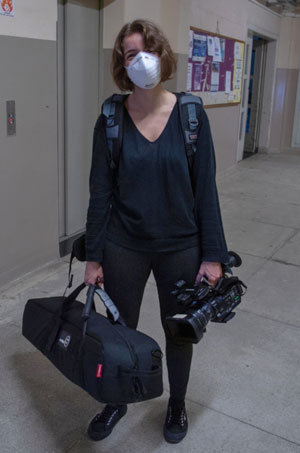
To be a journalist is to ask the questions nobody else will and to do the work nobody else can.
It means fact-checking public videos of dead bodies in Ecuador and mass graves in Brazil, tracking down the people who shot the footage, verifying the video’s accuracy by researching its metadata, and getting signed permissions, as 2014 alumna Elena Boffetta must do.
In her role as video editor and journalist for the Latin America bureau of the Agence France-Presse wire service, Boffetta has seen images of the dead burning in the streets, cadavers dumped by police, body bags piled up in hospitals.
“It takes a toll on your mental health,” she admits. “It’s frustrating to see the spread of fake information. Anyone can publish anything, and people rarely take the time to see where it comes from.”
To be a journalist is to find the untold story, including the ones hidden in plain sight.
“I keep thinking we can't do enough of the basics,” says 2011 alumnus Brian Resnick, a senior science reporter for Vox. “What this virus is, what it can do and how it changes our lives. What's the difference between isolation and quarantine, a ventilator and a respirator? It's like we've all been dropped in to study for a class no one signed up for.”
One of Resnick’s most recent projects has been a piece about how the human immune system works, in which he explains many aspects of the broader issue: immunity, vaccinations, why some people seem to be getting sicker than others.
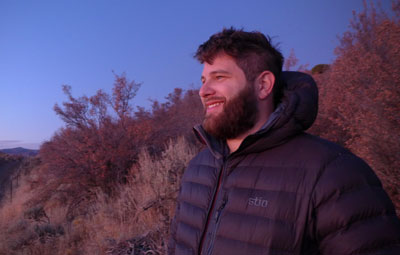
“Just learning how epidemiologists think about outbreaks has been helpful, too,” he adds. “I wrote a piece in January and then updated it in March about how scientists think an outbreak can end. In between updates, it was amazing how much changed in such a short period of time. I'm trying to be mindful of writing stories that focus on big-picture issues, and don't immediately become out-of-date.”
To be a journalist is to deliver crucial information in increasingly skeletal newsrooms. (Between 2008 and 2018, newspaper revenues declined by 62%, employment dropped by nearly half (47%), and circulations fell to their lowest level since 1940, according to a 2020 report from the Pew Research Center.)
“People always say, ‘We need local news now more than ever!’ with a frequency that almost makes me think they don't actually care to support it,” says Matt Butler, managing editor for the Ithaca Times. “But maybe this will make them realize it's true and invest.”
To be a journalist in 2020 is to work in a field where “there’s so much hate for what you do,” as Sonia Dasgupta puts it.
“It’s been tough to read a barrage of messages that are hate-filled or just ignorant about the disease,” says Dasgupta, digital content and strategy manager for a CBS station in Baltimore. “People don’t want to believe it’s a pandemic and take it out on ‘the media.’”
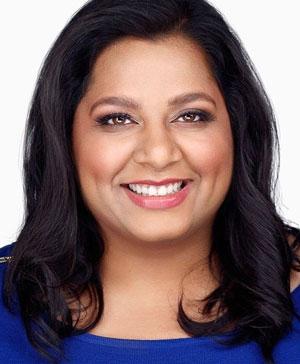
But to be a journalist is to persist—to work while recovering from COVID-19 symptoms or while mourning the loss of loved ones, always mindful of the privilege and responsibility that comes with the power of the pen.
“I was sick the last two weeks of March and first two weeks of April with many virus symptoms, and sometimes tried to work through headache, sore throat, cough, body aches and fever,” says Carla Correa, a metro desk editor for The New York Times. “What I learned is that this story is a marathon, not a sprint. It’s incredibly scary when your friends and colleagues are sick, your streets are eerily empty, and some of your stores are boarded up. None of this is normal.”
Indeed, to be a journalist is to make sense of the abnormal, and for UD journalists, it means always applying the lessons learned as an undergraduate.
“UD is where I first learned how to be a reporter,” says Marina Koren, science writer for The Atlantic and former editor-in-chief for UD’s independent student paper, The Review. “I am truly lucky to be employed as a journalist—my dream job—during probably the biggest news event in the last half-century, and I'm grateful to UD for providing me with a solid foundation for my career.”
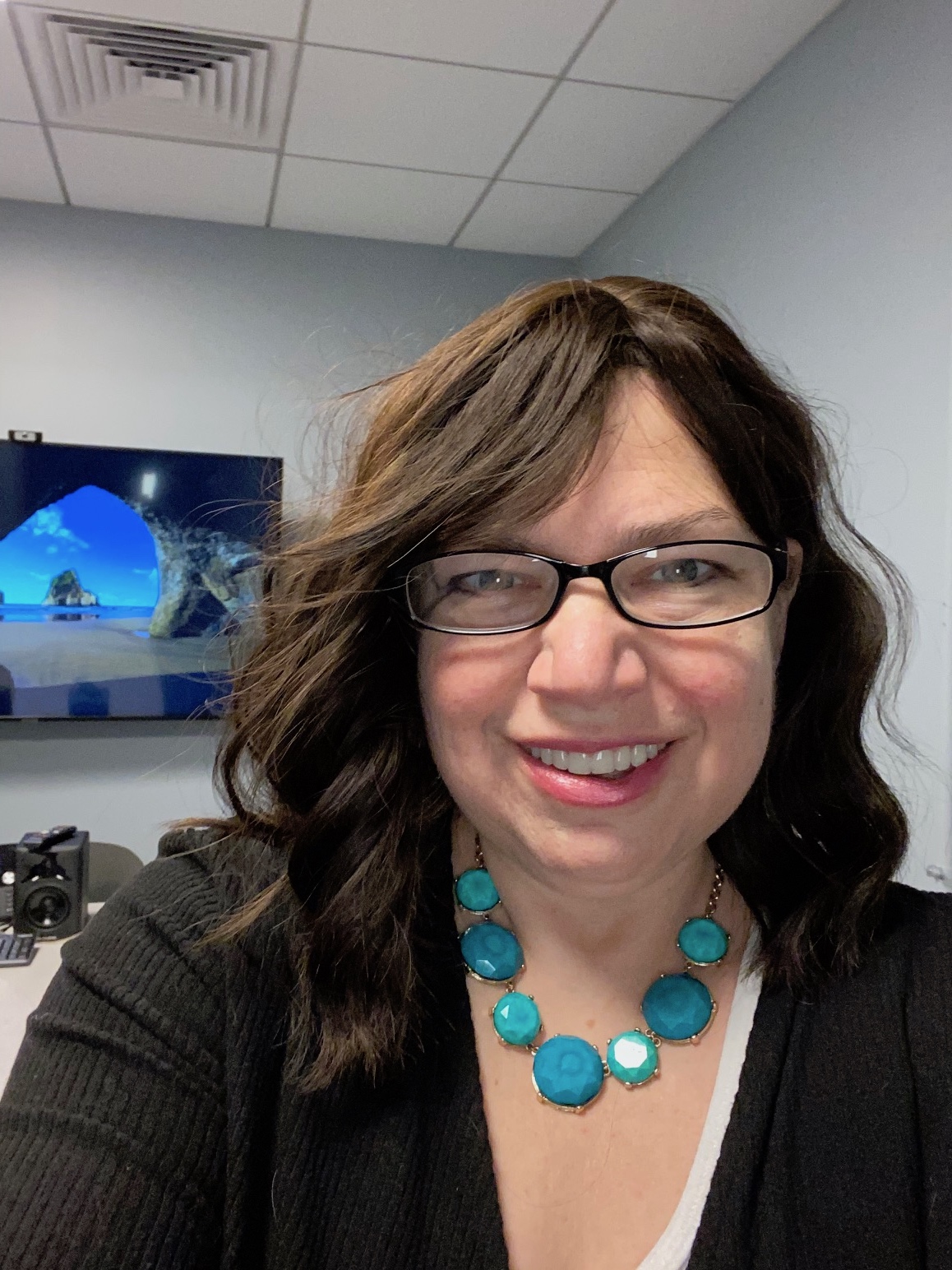
Fellow alumni echo her sentiments.
“I wouldn't be equipped for this situation without my time in the UD journalism program and on The Review,” says Jacob Orledge, the only reporter in the eastern half of Williams County, North Dakota. He added that it was “impossible to articulate” how much he relies on the skills he learned from his journalism professors, many of whom had been reporters themselves.
Alumni success is perhaps the greatest testament to a program that began as a single course in 1970, grew into a concentration for decades and only became an academic minor in 2007.
“When students graduate, they’re prepared to start a job, and because we have successful alumni and connections in the field, we can help our students get a job,” says Fallik, noting that UD’s prime location offers additional advantages: Students have interviewed then-Ravens quarterback Joe Flacco in Baltimore, flown on Air Force II in Washington, D.C., and covered the Democratic National Convention in Philadelphia.
These experiences are among the hallmarks of UD’s program. But the real measure of its success lies in the quality of reporting from its students and graduates.
Below, more than a dozen Blue Hen journalists share their experiences on covering the COVID-19 pandemic. Here’s what they have to say:
In their own words
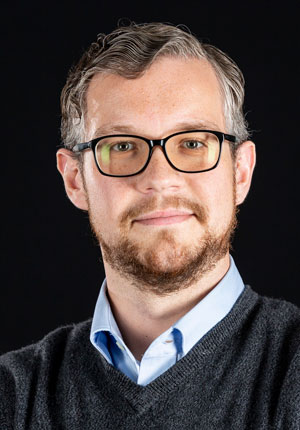
“One of my [April 11th] stories revolved around a 19-year-old college student named Marlise Yameogo who’s suffering from the symptoms of COVID-19. A nurse told her she likely has the disease, but because she's not in a high-risk group she couldn't get tested. Then a testing facility told her she'd need a referral, but she didn't have a family doctor and the earliest she could get in to see anyone was May 11—completely useless. She finally got a referral via a nurse practitioner but was told she'd have to drive an hour and 40 minutes to give a sample and that it would take several days just to schedule that.
“All of this played out in real time as I was talking to Marlise, so I got a glimpse of what it's like for patients to navigate this system. There's a lot of uncertainty and the bureaucracy doesn't make it easy for them to make informed health choices. As one expert told me, we are ‘flying blind.’
“I tend to be skeptical of feel-good jargon like "self-care" but there's value in turning off your reporter's brain for a few hours.”
Wallace McKelvey, Class of 2009, investigative reporter for The Patriot-News in Harrisburg, Pa. His work is often fed to The Philadelphia Inquirer and Pittsburgh Post-Gazette through a Spotlight PA collaborative investigative reporting project, and he recently won a Keystone Award from the Pennsylvania News Media Association.
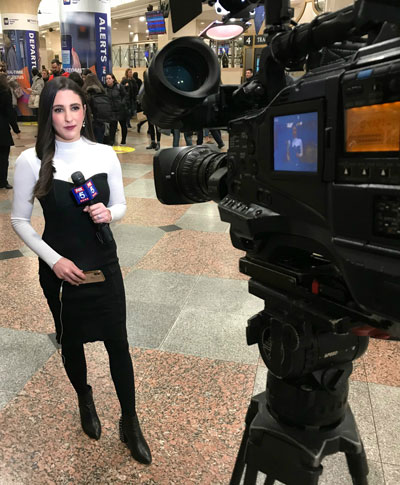
“Every day and every story is a challenge. Obviously hearing rising numbers of patients
every day is difficult to hear, as well as keeping up with the ever-changing numbers, stats and guidelines. But it's our responsibility to inform the public as journalists, and I feel lucky to have this privilege.”
Dana Arschin, Class of 2009, reporter for Fox 5 in New York City
“The pandemic started about a week after my reporter left the paper, so I guess I've learned that my capacity for stress is higher than I would've previously thought. Not only is the weight of this basically just on me (not complaining, I know I'm lucky to have a job), but the newspaper is doing so poorly without ads that they cut salaries.”
Matt Butler, Class of 2016, managing editor for the Ithaca Times
“Life in New York has irrevocably changed. A story we published on Elmhurst Hospital Center in Queens, and which I helped edit, was particularly impactful. One man's plight to get a test was heartbreaking: ‘Julio Jimenez, 35, spent six hours in the emergency room on Sunday night after running a fever while at work in a New Jersey warehouse. He returned on Monday morning to stand in the testing line in the pouring rain. On Tuesday, still coughing, eyes puffy, he stood in line for nearly seven hours and again went home untested.’
Carla Correa, Class of 2001, Metro Desk editor for The New York Times
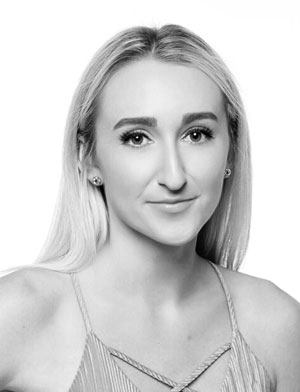
“The most challenging coronavirus story I’ve worked on so far was about the outbreak in Japan and speculation that the government there had been understating case numbers so that the Tokyo Olympics would be held as scheduled this summer. I worked with our Tokyo-based producer, who is also American, and it’s especially difficult for foreign journalists to gain access to information and be granted interviews with government officials… I’ve always believed that journalism is a kind of public service, and the world needs good journalists now more than ever. The industry needs your support!”
Morgan Winsor, Class of 2012, London-based multimedia reporter for ABC News
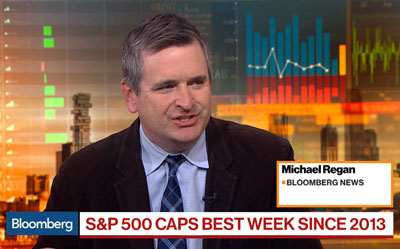
“Covering the financial markets has been nothing short of surreal and unprecedented, even more so than in the dramatic days of the financial crisis a decade ago. Almost 17 million unemployment claims in three weeks. (The weekly average prior to this was in the neighborhood of 200,000 per week.) Trillions of dollars in wealth lost, trillions of dollars of stimulus from the government and Federal Reserve to combat it. This isn’t just Wall Street fat cats losing money, it’s average people saving for retirement or their kids’ college education, pension funds for teachers and police and firefighters, etc.
“One of my job duties when there are big stories like this is to take a bunch of notes from a variety of reporters and weave it all into one narrative. Early on, we did a sort of human-interest story about how traders and money managers were dealing with the dual stress of the market implosion and the threats to their own health and loved ones’. One anecdote that stuck with me was a trader breaking the news to his toddler twin daughters that the family trip to Disney World was canceled. Yes, I know there are way more heartbreaking stories out there, but I remember the ecstasy in my own girls’ eyes at that age when we told them we were going to Disney, so this one really stuck with me as sort of symbolic of the lost joy this is causing among kids. All those canceled proms, canceled graduations, canceled Little League seasons, spring break trips, and even just the simple joy of Spring fever in Daylight Savings Time with your friends.”
Mike Regan, Class of 1993, senior markets editor for Bloomberg News
“I’ve covered so much breaking news in my career, but this breaking news story is so different. It is being experienced globally all at once and isn’t just isolated to one area. It’s also constant, it feels like there’s no time to take a break. Then when you’re off work, you’re living in the story, too. Normally you can separate yourself from a story, but this one you can’t. I see the data constantly, it’s a topic of conversation when I talk to family and friends. The worst hasn’t even happened here in Maryland yet, and I think knowing that is stressful too.”
Sonia Dasgupta, Class of 2007, digital content and strategy manager for WJZ-TV, a CBS station in Baltimore
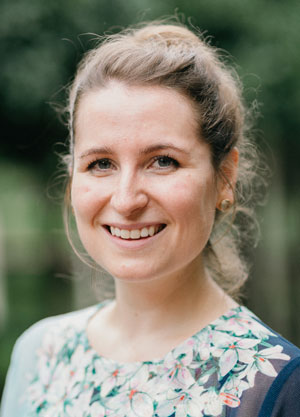
“I edited a story about a Jamaican immigrant who was, until shortly after the story published, locked up in an ICE detention center near Seattle, an epicenter of the outbreak in the U.S. At 49, she's not an old woman, but she has two chronic illnesses that make her especially susceptible to the virus. It's a simple story, but it's powerful.
“The challenge with editing it was that all of the reporting had to be done remotely. Normally, with a story like this, our writer would attempt to meet the subject, her lawyers and other sources. I worked closely with the writer to help him capture what she's like as a person and the vulnerable position she's in without ever seeing her or her surroundings in person.
“The skills I'm using doing this work—coordinating coverage, shaping stories, editing copy—I started developing at UD and at The Review.”
Nora Kelly Lee, Class of 2012, senior editor at The Atlantic
“We have been taking live shots on the radio and quickly turning them into audiograms. This is time sensitive because we want to get the information our guest has said out there as quickly (and accurately) as possible. Some of our guests have included Dr. Anthony Fauci, Governor Larry Hogan, Senator Tim Kaine, Margaret Brennan, Chuck Todd and others.
I have learned how careful you have to be about putting out information and confirming three times over that it is correct. Incorrect wording or not double-checking numbers can lead to thousands of people having the wrong information.”
Brett Snyder, Class of 2007, social media and engagement editor for WTOP radio in Washington, D.C.
“When C19 hit, we triaged our resources and began an online site on how the virus is impacting the legal industry, from criminal defense lawyers trying desperately to release immuno-compromised clients who are in jail awaiting trial, to health care practitioners navigating in-real-time law changes every day for their doctor clients, to elder law attorneys trying to figure out what to tell their devastated clients who were barred from visiting their parents in care because of fears of virus spreading. These fearless people all have come down to Earth. I do count it as a win that my little piece on how we ought to be rethinking prison in the wake of C19 hit the night before the WaPo’s story did, but they’ve all been challenging in the sense that the beat that I’ve been covering for so long became something different. The wall crumbled a little. Our conversations have taken on a different level of intimacy because it’s a shared grief and fear.”
Amy Kates White, Class of 2005, editor for Super Lawyers Magazine
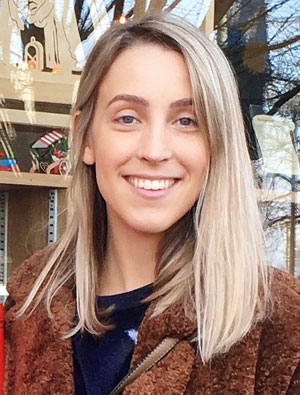
“I wrote a story about how nonprofits in the region are seeing a surge in demand for their food pantries. I learned from many of these organizations that 20 to 50% of the people they’re serving are first timers. These are people who have never used a food pantry or any crisis assistance services before but are now in that financial situation due to loss of income. It was very eye-opening and made me realize how fragile everyone’s lives are that a family who was doing just fine is now relying on nonprofit services. Never take a job or financial stability for granted.”
Karie Simmons, Class of 2013, news editor at the Charlotte Media Group, which produces four weekly papers covering the counties near Charlotte, N.C.
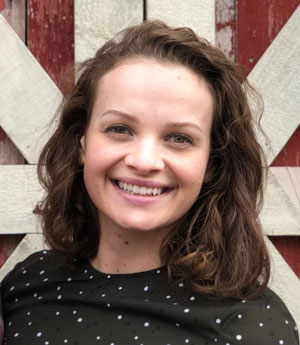
“I used to be a breaking-news reporter, which has come in handy now. (There’s plenty of opportunities for pandemic-related space stories, too.) I felt deeply for the people I spoke to for a story about videochatting with loved ones from afar, because, like so many others, I'm in the same boat, unsure of when I might see my family in person again.
Writing this story, about the human response to the outbreak and its influence on natural parts of the world, was slightly tricky because I didn't want to overstate the effects—it's hard to do any real research right now—but I did want to tell people about the ways nature is feeling the pandemic and the people who are trying to study them, knowing full well they've been presented with this rare, even exciting, opportunity because of an awful crisis.
Writing is often a source of stress for me. I love interviewing, reporting and researching—these tasks don't require sitting down by yourself and staring at a blank page, waiting for the words to come. But I have found, over the past few weeks, that the act of writing has provided some relief. Everyone is anxious right now, and it has been helpful to work through some of those anxieties by channeling them into story ideas and brainstorm sessions with my colleagues.”
Marina Koren, Class of 2012, staff writer on the science desk for The Atlantic
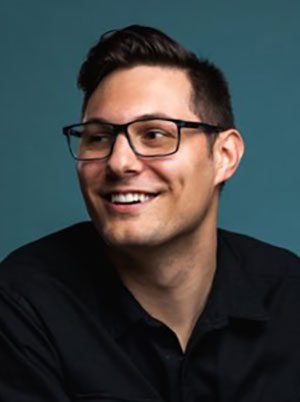
“As the travel reporter for a trade mag, my beat is kind of caving in and nobody knows know how bad it'll get yet. Companies are really cautious and aren't giving an inch. It feels really human to be scared right now.”
Ryan Barwick, Class of 2013, travel reporter for Adweek Magazine
“Editing a piece called 'May not one person go': How International students cope with a global pandemic" by Joseph DeMarco, one of our senior reporters, allowed us to ask, “What does it mean to be a student right now?”
“The Review had a meeting scheduled about two hours after the University announced its first coronavirus case, so I immediately moved the meeting online. I paused all of our routine coverage and told everybody it was time to ask bigger questions. We have written almost 50 stories about coronavirus this semester, about 40 since the week coronavirus hit the University.”
Jacob Baumgart, Class of 2020, Editor-in-Chief of The Review and an intern at The Philadelphia Inquirer
“I can't keep my foot on the gas pedal all the time. There's a lot of information to process here, every day. We have to be diligent, and study up. But that also grows exhausting and I don't have unlimited mental resources. Asking for a day off every now and then during this is so critical.”
Brian Resnick, Class of 2011, senior science reporter at Vox
“I'm the only reporter in the eastern half of Williams County [North Dakota], and I'm responsible for covering two rural towns and the surrounding area. The number of things the coronavirus has changed in our daily lives is astounding. I've written about eviction concerns, unemployment concerns, local businesses, how federal relief funds may affect our area, the impact on our critical access hospital in town, how cities are switching to remote attendance for public meetings, the local schools switching to distance learning. It's a never-ending stream of topics to cover and never enough time in the day to get to them all. It's also worth noting the COVID-19 virus spread to North Dakota later than elsewhere in the country so we are still in the early stages compared to Washington or New York.”
Jacob Orledge, Class of 2018, general assignment reporter for the Tioga Tribune
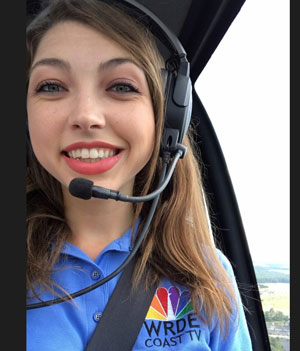
“I know many reporters are doing this too, but a lot of my stories are focused on what people need to know versus just reporting the death toll, negative impact on the economy, etc. I've done stories where I show people how to file for unemployment, where to find temporary jobs, how to apply for relief grants, etc. I think viewers find hope in stories like these.”
Mallory Metzner, Class of 2017, news reporter at WRDE Coast TV, the NBC affiliate for the Delmarva Peninsula
“As a journalist, I’ve learned how to prioritize international coverage. For instance, Uruguay just had its first death [in late March], and we didn’t cover it, because Uruguay has very few cases and one death, at this moment in time, is not a priority for international clients. However, there are other stories that need to be covered, pursued, reported on, and it has been interesting to learn how to identify relevant stories and prioritize coverage to also not strain and exhaust the desk and video journalists on the field.
“Personally, I learned how to take better care of myself. This crisis will unfortunately go on for quite some time and we need to learn how to cope and how to take care of ourselves or we won’t be able to see the end of it.”
Elena Boffetta, Class of 2014, video editor and journalist for the Latin America bureau of the Agence France-Presse wire service
Contact Us
Have a UDaily story idea?
Contact us at ocm@udel.edu
Members of the press
Contact us at 302-831-NEWS or visit the Media Relations website


